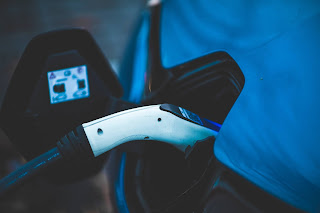INTRODUCTION -
Electric Vehicle a.k.a. EV as the name suggest are vehicles which work on electricity as their primary source of energy as compared to the conventional vehicles which use petroleum fuels(petrol, diesel, etc) as their energy source. The EV uses electric motors to provide the motion of the wheels required for mobility of the vehicle. These electric motors are driven by electric current which is supplied by the batteries located within the vehicle.
These batteries need to be charged from time to time, the function is similar to our phone batteries where we need to charge it once it’s drained. Electric vehicles have been researched since the 19th century, but these came into limelight once humanity realized the depleting amount of non-renewable fuels and the hazards caused by burning these.
Electric vehicles have been accepted worldwide as the future of the automobile industry. Companies
to name few - Tesla, BMW, Nissan, etc have been manufacturing these for the general
public throughout the EU and America. But are these really the future of the Indian
automobile industry?
CURRENT SCENARIO OF IC ENGINE VEHICLES -
As we all know, the combustion of fossil fuels releases harmful gases like CO2, CO, SOx, NOx, particulate matter, etc. , which is the major contributor to the air pollution not only n India but also in many developing countries like China, Brazil, etc.
IC engines have been used for about more than a century in vehicles, but in the near future this technology may strive for existence due to the ill effects of the fuel being used.
The Indian automobile the industry currently heavily relies on the IC engine vehicles to meet it sales targets, and due to unavailability of proper EV charging infrastructure the consumers are also inclined towards IC engines.
The government being implementing strict norms such as BS6 lately, still, it only reduces the ill effects but does not eliminate, which will not help in the long run.
Thus, it
is a decent time to switch to EV. Currently, IC engines contribute around
96% *of the total sales in India in the fiscal year 2019 with EV contributing mere
3.5%*.Even if there is an increase in sales of EV these years, most of them
only use it for short trips, there is very little reliability as the charging
infrastructure is not developed enough in India.
(*average values)
CURRENT SCENARIO OF EV -
The central and state governments have launched schemes and incentives to promote electric mobility in the country and some regulations and standards are also in place.
While the country stands to benefit in a large way by switching its transport from IC engines to electric motor-powered, there are challenges like lack of charging infrastructure, high initial cost and lack of electricity produced from renewable energy.
Some of the initiatives by the central government are
National Electric Mobility Mission plan 2020 which aims at granting incentives
to increase sales on EV, F.A.M.E.(Fast Adoption and Manufacturing of hybrid and
EV) which is a part of the former initiative which also aims for granting
incentives like the reduction of taxes, flat incentives, etc for construction of EV
charging infrastructure as well.
Automobile giants have launched few EV in India like - TATA Nexon, Hyundai Kona electric, MG ZS, etc but none of them have been a success till now due to the sole reason of less demand for EV.
SCOPE OF EV IN
INDIA -
The EV if the thought about replacing IC engines for the sole reason for increasing pollution won’t completely eradicate the problem but have only a minor effect. This is due to the reason then most of the electricity in India is still produced by coal power plants, as coal also produces the same harmful gases this transition won’t have a major effect of the environment as such.
Even if we do promote the sales of EV, consumers are driven away due to the unreliability of fuel, for lack of charging infrastructure. Although many companies like Tesla are planning to build their own chain of charging stations, India still falls way behind in it. The government has been issuing tenders for building charging stations lately to boost the EV ecosystem in India.
CONCLUSION -
EV -
PROS
- Clean and less
pollution-causing depending on the electricity production derivative.
- Silent
operation compared to IC engines
- Incentives
provided by the state as well as central governments
- Comparatively
simple construction
CONS
- Less reliable wart. IC engines
due to lack of charging infrastructure
- Costly as of now(mainly due to
batteries)
- The mindset of Indian consumers
still not ready to accept
- High-end technology(less
skilled labor available)
IC
engine -
PROS
- More reliable due to fuel
availability
- Comparatively low cost
- Repairing and maintenance becomes easy as labor related to it is abundant
CONS
- Increase in air and noise
pollution
- Very complex construction`
While the replacement of IC engines being inevitable for the automobile sector, EV seems to be a promising replacement. To tackle the environment impact by IC engines by replacing it with EV, India should first concentrate on producing clean and green electricity through solar, wind, tidal, etc.
Then it needs to improve the
EV charging infrastructure so as to build trust among customers when it comes
to reliability for long routes. One can say that EV is the future of automobile
industries not only in India but all around the world.
REFERENCES -
- https://www.financialexpress.com/auto/car-news/electric-vehicle-market-in-india-evolution-challenges-and-solutions/1738148/
- https://www.autocarpro.in/news-national/mahindra-starts-making-coronaviruscombating-aerosol-box-at-nashik-plant-56196
- https://en.wikipedia.org/wiki/Electric_vehicle
- https://en.wikipedia.org/wiki/Electric_vehicle_industry_in_India
Above
information are my views, may differ from actual results










